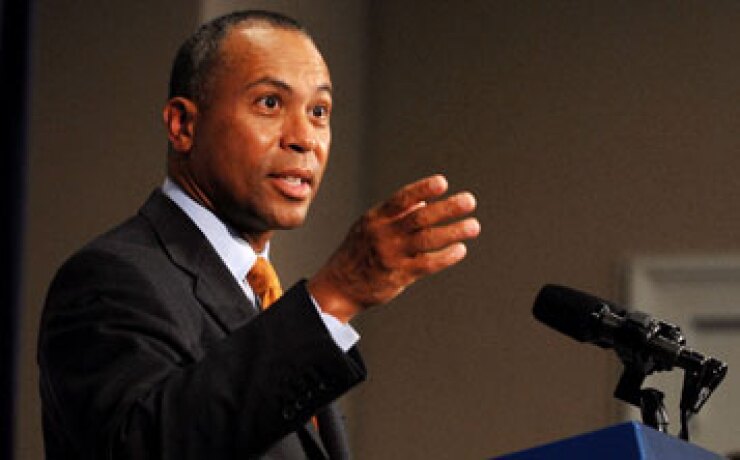
Massachusetts would advance its
"This shows the extension of
The administration and House and Senate leaders all concurred on this change, according to Dolan.
The move comes as bond rating companies are placing more emphasis on unfunded pension liability. Ratings for states such as Illinois and Pennsylvania have slipped as they struggled with deep pension liabilities.
Dolan
"I think the governor and legislative leaders came up with a plan that addresses both short term and long term needs," said Colin MacNaught, assistant treasurer for debt management. He called the move "a much-needed" measure of long-term pension contribution discipline.
"I don't think the state's ever laid out a specific contribution rate increase schedule to full funding," he said. "And the result is I think a credit positive."
Dolan also hopes the 2036 timetable will impress rating companies. Moody's Investors Service rates Massachusetts' general obligation bonds Aa1, while Fitch Ratings and Standard & Poor's assign equivalent AA-plus ratings.
S&P, in a report in advance of the state's $159.3 million sale of GO refunding Securities Industry and Financial Markets Association index bonds, under way Tuesday, cited the state's high debt and "significant unfunded pension [liabilities]" as offsetting considerations to its current rating.
"There's a real focus on long-term liability in general, not just for states but for cities and towns as well," said Dolan. "This is a step in the right direction."
The Massachusetts General Court about 20 years ago established 2028 as a target date for full pension funding. But in 2010, after the financial markets imploded, large investment losses and reduced government revenues prompted Massachusetts lawmakers to push the deadline back to 2030 and then 2040.
The Boston-based free-market think tank Pioneer Institute said deferring pension payments comes at a cost, "namely, the forgone investment returns that would have been generated had those monies had been deposited in the system in a timely manner," senior fellow Iliya Atanasov wrote in a position paper.
Patrick's proposed budget would withdraw $175 million from the stabilization, or rainy-day fund, leaving Massachusetts with a projected balance of just over $1.2 billion. The withdrawal is half of what the state removed for fiscal 2014. Its roughly $1.6 billion balance for fiscal 2013, the last year for which state rankings were available, placed the Bay State third behind Alaska and Texas.
Partially offsetting the withdrawal, said Dolan, is $122 million from capital gains tax receipts above expectations. State law requires the deposit of capital gains excesses into the rainy day fund.
The budget also would reduce the use of one-time resources to $334 million from $667 million. According to Dolan, state officials rely on a metric to gauge how much they can spend on one-shots.
Separately, state Treasurer Steven Grossman announced last week that the commonwealth's pension reserves investment trust fund returned 15.2% in calendar 2013, marking an investment gain of $7.9 billion, according to the Pension Reserves Investment Management board. The performance drove the net asset value of the PRIT fund to $57.9 billion.





